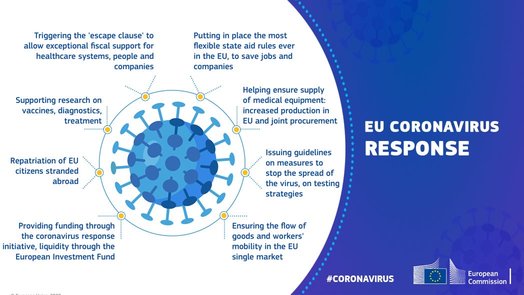Amendments to the Common Provisions Regulation – new flexibilities for financial instruments to respond to COVID-19 outbreak

As part of the Coronavirus Response Investment Initiative (CRII), the Common Provisions Regulation 1303/2013 (CPR) has been amended to enable European Structural Investment Funds to be mobilised by Member States to respond to the outbreak.
First amendment adopted
The first amending regulation ((EU) 2020/460) came into force on 1 April 2020.
The regulation amends the CPR and the ERDF Regulation 1301/2013 to include several measures that can be used in conjunction with financial instruments. These include:
- Flexibility to transfer resources within programmes;
- Amendment to Art 37(4) CPR indicates that financial instruments may provide support in the form of working capital to respond to the COVID-19 outbreak;
- A new category of ERDF eligible activity being ‘expenditure for operations fostering crisis response activities in the context of the COVID-19 outbreak’; and
- The amendment to Art 139 CPR to allow Member States to retain ESIF annual prefinancing as additional funding as part of the CRII that would otherwise have been recovered by the Commission.
Second amendment proposed
On 2 April 2020, the European Commission published a proposal for a second amending regulation (COM/2020/138 final).
This proposed regulation, which, if approved, is expected to come into force later in April, is intended to go beyond what is already possible and provide exceptional additional flexibility to respond to the COVID-19 outbreak. The regulation proposes further amendments to the CPR.
The measures proposed in the second amendment include:
- The temporary relaxation of the requirement to co-finance EU resources. A co-financing rate of 100% may be applied to payment applications made between 1 July 2020 and 30 June 2021;
- Further flexibility to transfer the 2020 resources for the Investment for growth and jobs goal between ERDF, ESF and Cohesion Fund. Resources transferred should be used in accordance with the rules of the receiving fund;
- The removal of the requirement to review and update ex-ante assessments where changes to existing financial instruments are necessary to respond to the COVID-19 outbreak; and
- When financial instruments provide support in the form of working capital, the removal of the requirement to provide as part of the supporting documents, new or updated business plans or equivalent documents and thus derogating from the need to verify that the support provided through the financial instruments was used for its intended purpose;
- Extension of the greater flexibilities to provide working capital support to EAFRD financial instruments; and
- Transfer of the Funds between categories of regions within a Member State for resources available for programming for the year 2020
In addition, the second amending regulation proposes an alignment of rules for undertakings in difficulty under Article 3(3) Regulation (EU) No 1301/2013 with the State aid approach for operations covered by the State aid Temporary Framework or the de minimis rules.
Other measures
The changes and (proposed changes) to the CPR are complemented by further legislation and communications published as part of the CRII. These include:
- The State aid Temporary Framework – this framework (as amended) introduces several flexibilities that could be used to scale up and enhance existing ESIF financial instruments and/or set up new schemes to support EU businesses; and
- Communication on public procurement from the European Commission on using the public procurement framework in emergency situation related to the COVID-19 crisis.
Further information will be made available on the fi-compass website in relation to the use of the new flexibilities as soon as they become available. Further information can also be found on the European Commission’s dedicated webpages.

